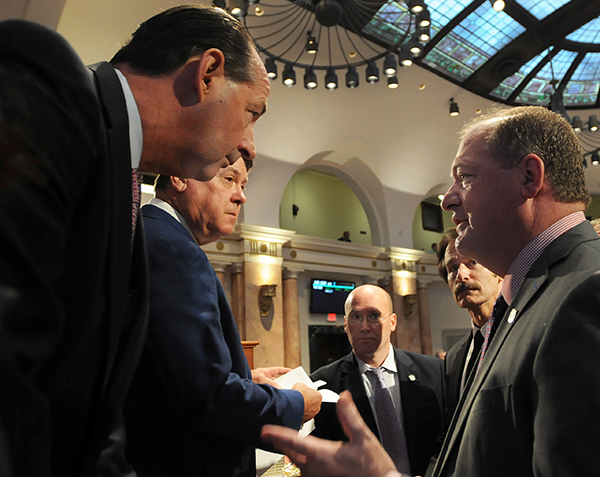PERSPECTIVES | Two-Year Budget Holds K-12 Funding Steady
Two-Year Budget Holds K-12 Funding Steady
Lawmakers in Frankfort concluded the 2016 Regular Session of the General Assembly in a flurry of activity during the waning hours of April 15. Shifting politics provided a dynamic backdrop — with a new governor, mid-session special elections and the prospect of a heated general election in November casting new shadows on the session’s debates.
The passage of the fiscal 2016-18 biennial budget dominated discussion, as it does in most even-year sessions, allowing little room for any other major policy changes. Enactment of the budget on the final constitutional day of the session precluded the General Assembly from overriding any vetoes of Gov. Matt Bevin.
Prichard Committee staff, members, parents, students and advocacy partners were extremely active in Frankfort throughout this session, substantially impacting the shape of education policy and the budget.
In particular, the Student Voice Team proved the driving force in increasing need-based financial aid through lottery-supported programs. As well, the Commi ttee and its partners through Strong Start Kentucky and Business Leader for a Strong Start were pivotal in the maintaining preschool investments and increasing access to both preschool and childcare.
ttee and its partners through Strong Start Kentucky and Business Leader for a Strong Start were pivotal in the maintaining preschool investments and increasing access to both preschool and childcare.
As a whole, the 2016 session preserved the building blocks of education, while making possible several strategic initiatives in early childhood and postsecondary. The hard work continues, as we continue to light the path to a larger life for all Kentuckians.
Here are major education highlights of the session — from preschool through postsecondary – reflecting vetoes issued by Gov. Bevin.
BREAKING DOWN BUDGET IMPACTS
Given the significant fiscal pressures facing the state due to underfunded pensions, many areas of government face 9 percent reductions in the next two years in the budget bill, known as House Bill 303. Reflecting it as a priority, reductions to education were either exempted or much less.
STATE PENSIONS — Facing unfunded liabilities in excess of $30 billion, funding for the public pensions systems – Kentucky Retirement Systems and Kentucky Teachers’ Retirement System — governed all other budgetary decisions. In the end, the pension systems received an additional $1.16 billion over the biennium — $973.4 million for teachers and $185.8 million for other public employees.
EARLY CHILDHOOD — Funding for preschool was exempt from reductions and remains at the FY 2016 level of $90.1 million annually. And while Gov. Bevin vetoed the increase in income eligibility for preschool from 160 percent to 200 percent of the federal poverty level (FPL), the Child Care Assistance Program (CCAP) received $10.6 million each year to increase eligibility from 150 percent of the 2011 FPL to 160 percent of the current FPL aligning eligibility between the two programs. Moreover, $15 million over the next two years is allocated to grants to incentivize collaborative preschool delivery models through partnerships between school districts and private childcare providers. Aligning eligibility and incentivizing public-private partnerships will allow more of Kentucky’s children access to much needed early learning and development programs. And by blending local resources — public preschool and child care assistance – children can be served in environments that best suit their needs while also supporting families that rely on services to keep working.
K-12 — Funding for K-12 was largely exempt from budget reductions and maintained at the current level. This includes the state’s main education funding formula, SEEK, and other non-SEEK support services such as Family Resource and Youth Service Centers (FRYSCs), extended school services, teacher professional development, and instructional resources.
POSTSECONDARY — Funding for postsecondary education was a significant pivot point in budget negotiations and the impacts to institutional funding, student financial aid, and the inclusion of performance funding are mixed. This was punctuated by the Governor’s current year cuts to institutions, the legality of which the Attorney General is challenging in court. Franklin Circuit Court Judge Thomas Wingate upheld the governor’s action in a May 18 ruling, which Beshear said he will appeal. Funding for postsecondary education and how best to utilize these resources to achieve student success and fulfill institutional missions deserves renewed focus in future legislative sessions.
INSTITUTIONAL FUNDING — The pattern of disinvestment in public postsecondary institutions that has persisted since 2008 continues with 4.5 percent reductions to most campuses, with the exception of Kentucky State University, one-half of the 9 percent originally proposed by both the Governor and the Senate. This amounts to a reduction of $59.1 million over the biennium and represents an 18.2 percent decline in funding since FY 2008, or $197 million. The costs of such disinvestment are ultimately born by students and families as evidenced by the recent approval of roughly 5 percent increases in tuition for the 2016-17 academic year at most campuses. This is of great concern as more Kentucky students are college- and career-ready and value the pursuit of higher education as a means to a better life.
STUDENT FINANCIAL AID — In contrast to institutional funding, state student financial aid increased over the biennium. While the General Assembly provided an additional $55 million in need-based aid through the lottery-funded College Access Program (CAP) and Kentucky Tuition Grant (KTG) – which could have served 30,000 more financially disadvantaged students – the governor’s veto of parts of House Bill 10 effectively reduces this increase to $15 million. This level of increase still provides aid to up to 8,000 more needy students. Two new programs were also created in the budget to help increase college access and attainment. The Work Ready Kentucky scholarship will receive $15.9 million in FY 2018 and the Dual Credit scholarship will still receive $15 million over the biennium, although the Governor’s veto of House Bill 626 leaves details of how the programs will work to be determined. More funding for student financial aid signals progress toward making postsecondary education possible for all Kentuckians and work remains to increase financial assistance to those students who need it most.
PERFORMANCE-BASED FUNDING — The budget initiates the process by which postsecondary institutions will receive part of their funding based on performance against certain metrics. In fiscal 2018, 5 percent of funding will be performance-based. House Bill 626, which scheduled increases to 15 percent in fiscal 2019 and 25 percent in fiscal 2020 and beyond, was vetoed by the governor. A working group comprised of institutional presidents, the governor, and legislative leadership will provide formula recommendations for the performance-based model by Dec. 1, 2016. The inclusion of a performance-based postsecondary finance model is a promising first step in substantially linking public investment to actual outcomes and measures of quality and performance.
OTHER LEGISLATION
Senate Bill 1 was an omnibus reform package to K-12 education policy proposed by Senate Republicans. The bill proposed significant reforms including a formalized standards review process and changes to assessments, accountability and teacher evaluation. The Senate passed the measure 25-12, but it was not given a hearing in the House. Elements of the proposal are likely to reappear in future sessions.
Senate Bill 253 proposed a five-year charter school pilot program for Jefferson and Fayette counties. The Senate passed the measure 28-9 after amending the proposal so that only local boards of education could authorize charter schools. The House did not consider the bill. The debate over charter schools is likely to continue in future sessions.
Senate Bill 196, supported by the Prichard Committee, established the Books for Brains Program that would provide an age appropriate book each month to children five-years-old or younger. The bill passed both the House and Senate unanimously, but was vetoed by the Governor citing budget constraints and the need for a comprehensive evaluation of early childhood programs.
For more information on this session, the budget and relevant details check out the Prichard Blog and updates on our web site.
* * *


